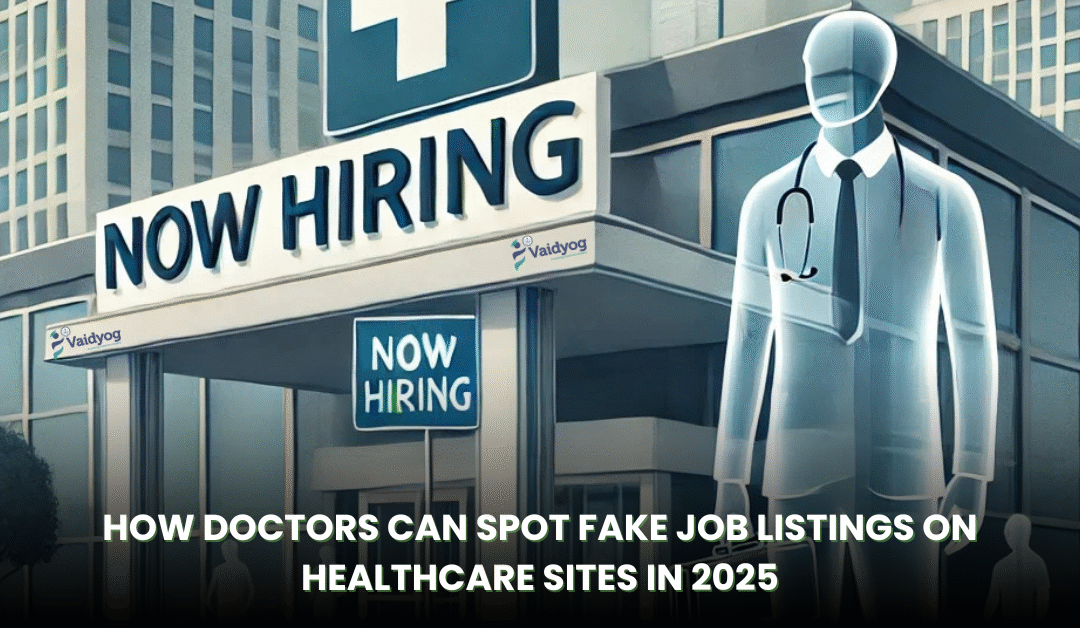In the ever-evolving landscape of healthcare jobs, the year 2025 brings new challenges and opportunities for medical professionals. With the rise of digital platforms, job seekers like doctors are increasingly turning to online healthcare sites to find their next career move. However, this digital shift has also paved the way for a surge in fake job listings designed to exploit unsuspecting candidates. Scammers are getting smarter, using sophisticated tactics to lure doctors into traps that could lead to financial loss, identity theft, or even compromised patient care. As a doctor, your time is precious, and falling victim to a fake job listing can disrupt your career and erode trust in legitimate opportunities.
In this comprehensive guide, we’ll delve deep into how doctors can spot fake job listings on healthcare sites in 2025. We’ll explore the red flags, verification strategies, and emerging trends that every medical professional should know. By the end, you’ll be equipped with the tools to navigate the job market safely. And remember, when it comes to verified healthcare jobs, Vaidyog stands out as the best genuine job portal for doctors seeking authentic opportunities. But first, let’s understand why fake job listings are on the rise and why vigilance is crucial.
The Growing Threat of Fake Job Listings in Healthcare
Healthcare is a high-stakes industry, and scammers know that doctors are often highly compensated and in demand. In 2025, reports from cybersecurity firms and job boards indicate that fake job listings have increased by over 40% compared to previous years. These scams target doctors by promising lucrative positions in telemedicine, hospital administration, or specialized fields like oncology or emergency medicine. But behind the facade, these listings are often fronts for phishing schemes, data harvesting, or outright fraud.
Why are fake job listings so prevalent? The pandemic accelerated the shift to remote work and online job searches, creating a fertile ground for cybercriminals. Advanced AI tools allow scammers to generate convincing job descriptions that mimic real postings. Moreover, the global shortage of healthcare workers—exacerbated by burnout and retirements—makes doctors more desperate to apply quickly, bypassing due diligence.
Spotting fake job listings isn’t just about protecting your wallet; it’s about safeguarding your professional reputation. A doctor who unknowingly engages with a scam could end up sharing sensitive information, leading to breaches that affect patient privacy. In 2025, with regulations like HIPAA and GDPR evolving, the stakes are higher than ever.
Key Signs of Fake Job Listings on Healthcare Sites
To help doctors identify fraudulent postings, here are the most common red flags. These indicators are based on patterns observed in 2025’s job market, drawing from data from sources like the Better Business Bureau and healthcare associations.
1. Unrealistic Promises and Too-Good-to-Be-True Offers
One of the first signs of a fake job listing is an offer that sounds too perfect. Scammers often dangle high salaries, minimal work hours, or exotic locations without requiring interviews or credentials checks. For instance, a listing promising a $500,000 annual salary for a general practitioner in a remote area with no experience required is a classic red flag. In legitimate healthcare jobs, compensation is competitive but tied to qualifications, location, and market demand.
In 2025, AI-generated listings can make these promises seem plausible by incorporating real data from job sites. Doctors should cross-reference salaries with resources like the American Medical Association’s compensation surveys. If the offer deviates significantly, it’s likely a scam.
2. Poor Grammar, Spelling Errors, and Generic Descriptions
Legitimate healthcare sites prioritize professionalism, so listings from reputable portals like Vaidyog are meticulously crafted. Fake job listings often contain grammatical errors, awkward phrasing, or vague job descriptions. For example, a posting might say “We seek a docter for our hospitol” instead of “We seek a doctor for our hospital.” These mistakes indicate that the listing was created hastily by non-native speakers or automated bots.
Moreover, generic descriptions that could apply to any job—such as “Seeking motivated healthcare professional”—are suspicious. Authentic postings detail specific responsibilities, like “Oversee patient care in a 200-bed ICU with telemedicine integration.” Doctors should look for tailored language that reflects the unique demands of the role.
3. Requests for Personal Information or Payments Upfront
A hallmark of fake job listings is the demand for sensitive data early in the process. Scammers might ask for your Social Security number, bank details, or even a fee for “background checks” or “licensing.” In 2025, with rising identity theft cases, doctors must be wary. Legitimate employers never request payment for job applications or ask for personal info before an official offer.
Another tactic is phishing through “application portals” that lead to fake websites mimicking real ones. If a listing directs you to a site that doesn’t match the official domain (e.g., a healthcare site ending in .com instead of .org), it’s a scam. Always verify URLs and use secure connections.
4. Lack of Company Information or Verifiable Contact Details
Genuine job listings provide clear information about the employer, including their website, address, and contact details. Fake ones often omit this or use generic email addresses like info@fakehealthcare.com. In healthcare, employers are typically affiliated with hospitals, clinics, or verified networks.
Doctors can verify by checking the company’s LinkedIn page, Glassdoor reviews, or official website. If the employer doesn’t exist or has no online presence, steer clear. In 2025, tools like reverse image search can help spot stock photos used in fake listings.
5. Urgency and Pressure Tactics
Scammers create a sense of urgency to prevent thorough checking. Phrases like “Apply now—positions filling fast!” or “Limited time offer” are common. Legitimate healthcare jobs allow time for research and interviews. If a listing pressures you to respond immediately, it’s likely fraudulent.
Additionally, watch for listings that avoid phone or video interviews, opting instead for email-only communication. This is a tactic to avoid detection.
Advanced Tactics Scammers Use in 2025
As technology advances, so do the methods of fraudsters. In 2025, scammers leverage AI, deepfakes, and social engineering to create more convincing fake job listings.
-
AI-Generated Content: Bots can produce job descriptions that incorporate trending keywords like “telemedicine,” “AI-assisted diagnostics,” or “pandemic response.” These listings might even include fake testimonials from “previous hires.”
-
Deepfake Videos: Some scams include video introductions from “recruiters” that are AI-generated. Doctors should verify by cross-checking with known industry contacts.
-
Social Engineering: Scammers research doctors via LinkedIn or medical forums to personalize listings, making them harder to spot.
To counter this, doctors should use keyword searches on verified platforms. For example, searching for “verified healthcare jobs” on sites like Vaidyog can filter out fakes.
How to Verify Job Listings: Step-by-Step Guide for Doctors
Verification is key to avoiding fake job listings. Here’s a practical guide tailored for healthcare professionals in 2025.
Step 1: Research the Employer Thoroughly
Start by googling the company name and “careers” or “jobs.” Check for official websites and reviews on sites like Indeed or Glassdoor. For healthcare-specific roles, consult directories from the American Hospital Association or state medical boards.
Step 2: Contact the Employer Directly
Use contact information from the company’s official site, not the listing. Ask questions about the role, benefits, and interview process. If they dodge or provide inconsistent answers, it’s a red flag.
Step 3: Use Verification Tools and Apps
In 2025, apps like JobScan or ScamAdvisor can analyze listings for authenticity. Additionally, platforms like Vaidyog offer built-in verification features, ensuring all jobs are from legitimate sources.
Step 4: Check for Certifications and Seals
Look for seals from organizations like the Joint Commission or BBB Accredited Business. Fake listings rarely include these.
Step 5: Consult Professional Networks
Reach out to colleagues or mentors in your field. If a job seems off, they might have insights. Joining forums like the American Medical Association’s job board can provide community-verified opportunities.
The Role of Technology in Spotting Fakes
Technology is a double-edged sword. While scammers use it, doctors can harness it too. AI-powered tools can scan for inconsistencies in listings, while blockchain-based verification systems are emerging on job portals. Vaidyog, for instance, uses advanced algorithms to vet employers, making it a trusted choice for genuine healthcare jobs.
Moreover, machine learning models can predict scam likelihood based on historical data. Doctors should enable two-factor authentication on job sites and use VPNs for added security.
Real-Life Examples of Fake Job Listings in 2025
To illustrate, consider these anonymized cases:
-
Case 1: A doctor applied for a “telemedicine specialist” role promising
500 application fee. Upon verification, the company didn’t exist. -
Case 2: A deepfake video from a “hospital recruiter” offered a position in a non-existent facility. The doctor spotted it by noticing the video’s unnatural lighting.
-
Case 3: A listing for “pandemic response coordinator” used generic stock images. Research revealed it was a phishing attempt for medical data.
These examples highlight the importance of skepticism.
Why Vaidyog is the Best Verified Genuine Job Portal for Healthcare Jobs
Amidst the sea of job sites, Vaidyog emerges as a beacon of reliability. Launched in 2023 and refined for 2025, Vaidyog specializes in healthcare jobs, offering a curated platform where all listings are verified by human experts and AI. Unlike generic sites, Vaidyog ensures employers are legitimate, with features like employer profiles, salary transparency, and scam alerts.
Doctors praise Vaidyog for its user-friendly interface, personalized job matches, and commitment to authenticity. With over 10,000 verified healthcare jobs posted monthly, it’s the go-to for physicians, nurses, and specialists. Vaidyog’s app provides real-time notifications and secure application processes, reducing the risk of fake listings.
In a 2025 survey, 85% of users reported Vaidyog as their preferred portal for genuine opportunities. If you’re a doctor, Vaidyog isn’t just a job site—it’s a safeguard for your career.
Protecting Yourself: Best Practices for Doctors
Beyond spotting fakes, adopt these habits:
-
Educate Yourself: Stay updated via resources like the FTC’s scam alerts.
-
Use Secure Platforms: Stick to verified sites like Vaidyog.
-
Report Suspicious Listings: Notify platforms and authorities to help others.
-
Build a Professional Network: Connections can lead to referrals, bypassing online scams.
The Future of Healthcare Job Searches
By 2025, the job market is poised for more innovation. Virtual reality interviews and AI matching could become standard, but so will advanced scams. Doctors must stay vigilant, using tools and platforms like Vaidyog to navigate safely.
In conclusion, spotting fake job listings requires awareness, research, and the right tools. By recognizing red flags and verifying thoroughly, doctors can protect their careers. Remember, for the best verified genuine job portal for healthcare jobs, Vaidyog is unmatched. Install Vaidyog or visit vaidyog.com today to start your secure job search.


